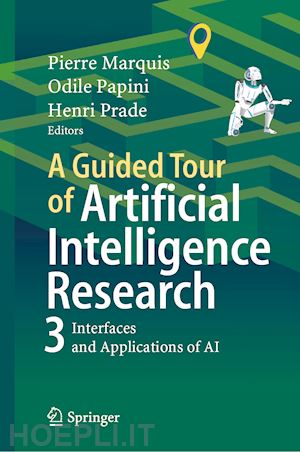
Questo prodotto usufruisce delle SPEDIZIONI GRATIS
selezionando l'opzione Corriere Veloce in fase di ordine.
Pagabile anche con Carta della cultura giovani e del merito, 18App Bonus Cultura e Carta del Docente
The purpose of this book is to provide an overview of AI research, ranging from basic work to interfaces and applications, with as much emphasis on results as on current issues. It is aimed at an audience of master students and Ph.D. students, and can be of interest as well for researchers and engineers who want to know more about AI. The book is split into three volumes:
- the first volume brings together twenty-three chapters dealing with the foundations of knowledge representation and the formalization of reasoning and learning (Volume 1. Knowledge representation, reasoning and learning)
- the second volume offers a view of AI, in fourteen chapters, from the side of the algorithms (Volume 2. AI Algorithms)
- the third volume, composed of sixteen chapters, describes the main interfaces and applications of AI (Volume 3. Interfaces and applications of AI).
This third volume is dedicated to the interfaces of AI with various fields, with which strong links exist either at the methodological or at the applicative levels. The foreword of this volume reminds us that AI was born for a large part from cybernetics. Chapters are devoted to disciplines that are historically sisters of AI: natural language processing, pattern recognition and computer vision, and robotics. Also close and complementary to AI due to their direct links with information are databases, the semantic web, information retrieval and human-computer interaction. All these disciplines are privileged places for applications of AI methods. This is also the case for bioinformatics, biological modeling and computational neurosciences. The developments of AI have also led to a dialogue with theoretical computer science in particular regarding computability and complexity. Besides, AI research and findings have renewed philosophical and epistemological questions, while their cognitive validity raises questions to psychology. The volume also discusses some of the interactions between science and artistic creation in literature and in music. Lastly, an epilogue concludes the three volumes of this Guided Tour of AI Research by providing an overview of what has been achieved by AI, emphasizing AI as a science, and not just as an innovative technology, and trying to dispel some misunderstandings.











Il sito utilizza cookie ed altri strumenti di tracciamento che raccolgono informazioni dal dispositivo dell’utente. Oltre ai cookie tecnici ed analitici aggregati, strettamente necessari per il funzionamento di questo sito web, previo consenso dell’utente possono essere installati cookie di profilazione e marketing e cookie dei social media. Cliccando su “Accetto tutti i cookie” saranno attivate tutte le categorie di cookie. Per accettare solo deterninate categorie di cookie, cliccare invece su “Impostazioni cookie”. Chiudendo il banner o continuando a navigare saranno installati solo cookie tecnici. Per maggiori dettagli, consultare la Cookie Policy.